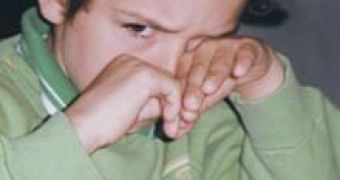Parents of toddlers may be serving up stereotypes about body image that could contribute to eating disorders or behavioral problems later in life, according to a pair of new Florida State University studies conducted in Tallahassee, Fla.
Researchers found that parents of 3-year-olds worried that their sons but not their daughters were underweight, even though the weights and body mass index of the boys and girls in the study were nearly identical. They also said that their daughters ate enough food, but their sons did not.
The findings suggest that parents may be buying into gender stereotypes about appetite and body size even with children as young as 36 months old. The studies, co-authored by FSU's Bright-Burton Professor of Psychology Thomas Joiner, graduate student Jill Holm-Denoma and post-doctoral student Ainhoa Otamendi, as well as colleagues from the Oregon Research Institute and Wesleyan University, were published in the International Journal of Eating Disorders.
"Parents are buying into the media ideal of thinness for girls and perceiving that their daughters may not be thin enough, even at this young age," Joiner said.
"They also have stereotypes about male culture that boys should be big and strong and physical."
It's what Joiner believes is part of parents' increasing pursuit of perfect lives for their children. Parents want their children to have the right clothes, the right friends, the right activities and even the right body. The problem is that parents' views on how their children should eat may affect their eating habits at very young ages, he said.
"While parents' intentions are good, their worries about their children's eating habits and body size are misplaced and not at all helpful," Joiner said. "The only time a parent should be concerned is if a young child is not eating at all or is under eating in a very noticeable way. With kids who overeat, restriction does not work. Instead, parents should offer them a variety of healthy foods to choose from and encourage exercise."
On the other hand, parents may be reluctant to admit their child has a weight problem. No mother or father in this study reported that their child was fat, despite the fact that approximately 20 percent of the girls and 18 percent of boys in this sample would be classified as overweight based on the body mass index data gathered from parents' reports of their child's height and weight. This finding calls into question parents' ability to accurately describe their child's body shape and size.
RESURSE
Eating Sweets Lowers Your Stress Level
Massive Buttocks Block Injectable Medicines
Fructose, One of the Compounds Responsible for the Rising Obesity Rates

 14 DAY TRIAL //
14 DAY TRIAL //